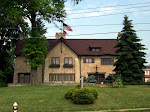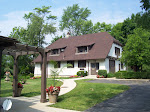An excerpt taken from
Mahoning Memories
A History of Youngstown and Mahoning County
by Frederick J. Blue, William D. Jenkins, H. William Lawson, & Joan M. Reedy
In the mid to late 1800's David Tod was one of the most successful of a growing group of Youngstowners who combined business interests, such as the canal and railroad, with politics. He was the son of a prominent attorney, George Tod of Connecticut, who had come to Youngstown in 1800 with his wife Sarah and two children. David was born in 1805, was raised at the family's expansive farm at Brier Hill, and attended neighborhood schools and the Burton Academy in Geauga County before studying law and being admitted to the Ohio bar in 1827. He was married in 1832 to Maria Smith of Warren. They had three daughters and four sons. When Tod inherited his father's estate in 1841, he continued his business and political activities and opened one of the first coal mines in the Valley. In addition to shipping his coal west and then north to Lake Erie via the Pennsylvania and Ohio canal, he helped to pioneer the use of the high-quality "Brier Hill" coal as a fuel in local blast furnaces in the reduction of iron ore. His economic pursuits led from the canal to railroads. In combination with promoters from Youngstown, Warren and other areas he helped form the Cleveland and Mahoning Railroad and served as its president from 1858 until his death in 1868. He established the Brier Hill Iron and Coal Company, having bought the iron works of the Akron Manufacturing Company and moving it to his Youngstown properties. He thus helped to strengthen the Valley's iron industry.
Despite his prominence in the economic development of the Mahoning Valley, Tod was even better known throughout the state and nation as a Democratic politician. After running unsuccessfully for governor in 1844 and 1846, losing in both instances to Whig candidates by narrow margins, he was appointed by President James K. Polk as minister to Brazil, a post he held for five years. Between 1851 and 1861, he concentrated on his coal, iron and railroad interests in the Mahoning Valley before returning to politics.
The Civil War brought Tod his greatest political prominence. A strong supporter of Democratic presidential candidate Stephen A. Douglas in 1860, he played a central role in the party convention in Baltimore, which chose the Illinoisan to oppose Abraham Lincoln. Following Douglas's defeat, the Union party combined Lincoln's Republicans with War Democrats like Tod who supported the military effort against the Confederacy. Having helped organize a Youngstown company of troops as a part of the Seventh Ohio Voluntary Infantry, Tod was a logical candidate for governor on the Union ticket in 1861. He won a substantial victory, and as Youngstown's only governor in almost two hundred years of Ohio history, he was forced to deal with virtually insolvable problems.
During Tod's tenure, the war came briefly into Ohio with the raid of Confederate leader Colonel John H. Morgan across the southern counties and as close to the Mahoning Valley as Salineville in Columbiana County. Tod was successful not only in his preparations for the military defense of Ohio but also in providing for the welfare of Ohio soldiers and in dealing with the politics of civilian critics and the incessant demands for military promotions. Nonetheless, he antagonized enough of his fellow Union party colleagues to deny him renomination in 1863. In mid 1864 he rejected Lincoln's offer to appoint him secretary of the treasury, preferring to spend his declining years managing his many economic ventures.






